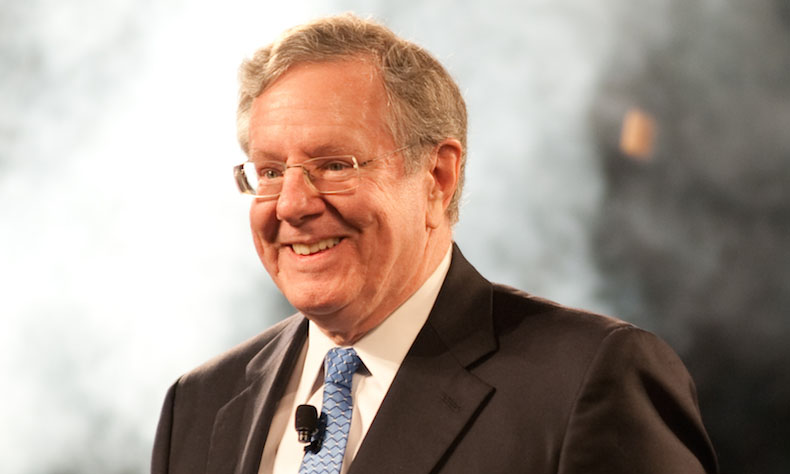In a recent interview with Newsmax’s Jeremy Frankel, Steve Forbes, the Chair and Editor of Forbes Media, sounded the alarm on the escalating federal budget deficit under President Joe Biden, cautioning that it represents more than just paper money—it is the depletion of resources from the American people. Forbes, known for his sharp economic acumen, spoke candidly on “Rob Schmitt Tonight,” emphasizing the need to allocate resources to the hands of the American people, who can utilize them far more productively than the bureaucrats in Washington. He warned that the rise of political cronyism would be inevitable and detrimental to the economy.
Forbes expressed concern about the ongoing negotiations over the debt ceiling between the White House and the House GOP. While he predicted some concessions might be made, he expressed confidence that House Speaker Kevin McCarthy, a Republican from California, would not yield to President Biden’s demands. Forbes called for McCarthy to hold out on extending the debt ceiling until next spring, in order to hold the Biden administration accountable for its fiscal policies.
“So, you get a couple trillion this year. Not a lot, given the math in Washington, but it’s a start and also sets the stage for setting a base in the 2024 campaign,” Forbes remarked, suggesting that taking a firm stance on the debt ceiling extension would be crucial for future electoral campaigns.
Moreover, Forbes voiced his concerns over the defunding of the 87,000 new IRS agents that were introduced in the Inflation Reduction Act last year. He disapproved of the idea of burdening the middle class and small businesses with intrusive IRS agents, referring to it as “legalized extortion.” Forbes urged the House GOP not to back down on this issue and to firmly assert that the allocated funds should be removed from the budget.
Responding to House Assistant Democrat Leader Rep. Jim Clyburn’s suggestion that the Fourteenth Amendment could grant Biden unilateral authority to raise the debt limit, Forbes dismissed the idea as “preposterous.” He likened it to the actions of past tyrants who circumvented Congress, emphasizing the importance of upholding democratic principles and the role of Congress in matters of fiscal policy.
While concerns loom about the possibility of a default, Forbes remained optimistic, pointing out that the United States still has incoming funds that could cover essential expenses such as interest payments, Medicare, Medicaid, and military spending. He dismissed the fearmongering surrounding the situation, stating that there is more room for maneuvering than is commonly acknowledged. Forbes criticized the notion of raising taxes to resolve the economic crisis, emphasizing that such measures would only further harm the economy without generating substantial revenue.
In a thought-provoking article for Dailymail.com, Forbes delved deeper into the issue of inflation. He criticized the Federal Reserve’s decision to raise interest rates, drawing an analogy to a dentist performing a root canal on a patient with a heart condition. Forbes argued that such actions would not provide the desired relief but would instead exacerbate the problem.
According to Forbes, the underlying causes of inflation are primarily non-monetary, such as disruptions in the supply chain due to factors like wars, hurricanes, and pandemics. He urged policymakers to address these supply-side issues rather than solely focusing on demand-side policies. Forbes expressed concern that the actions taken by the Federal Reserve and the Biden administration, including burdensome regulations and restrictions on domestic energy production, are worsening inflationary pressures.
Drawing parallels to the stagflation era of the 1970s, Forbes highlighted the adverse impact on the average American family, including higher prices, rents, mortgage payments, and increased borrowing costs. He emphasized that making people poorer is not a viable solution to combat inflation. Forbes emphasized the need for the Federal Reserve to prioritize stabilizing the dollar and suggested a return to a gold standard or closely monitoring gold and commodity prices, as successfully practiced by former Chairman Alan Greenspan.
Furthermore, Forbes called for a reduction in taxes and regulations, urging the government to halt politically motivated spending sprees. He pointed to the positive outcomes of deregulation during the 1970s, highlighting President Jimmy Carter’s initiatives in the transportation sector, which revitalized industries and stimulated economic growth.
Forbes cautioned against condemning Americans to the malaise of stagflation experienced in the past. He advocated for fueling the engine of American business and revitalizing the economy. By empowering individuals with resources, reducing government interference, and adopting sound monetary policies, Forbes believed that the nation could avoid the pitfalls of stagflation and pave the way for a stronger, more prosperous future. As the economy faced mounting challenges, his words served as a clarion call to prioritize prudent economic management and ensure the well-being of the American people.
